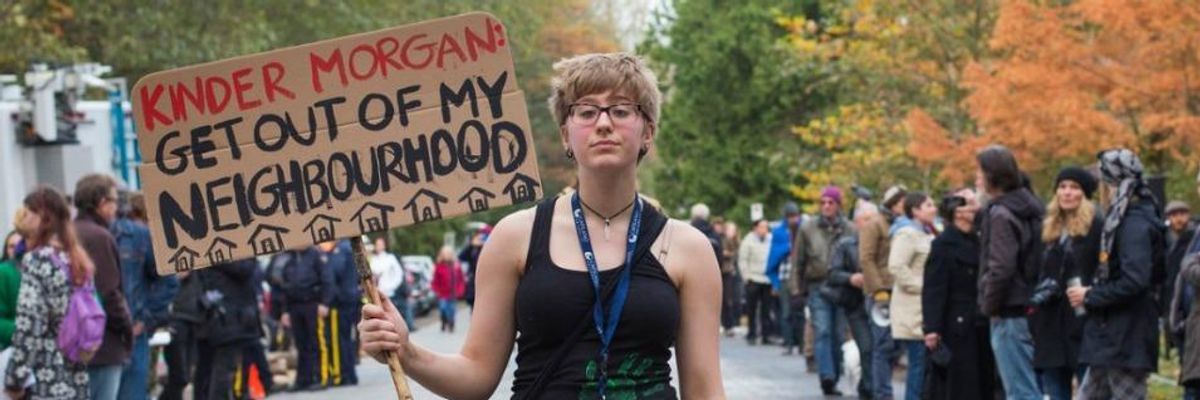Late Monday afternoon a court injunction came into effect that made lawbreakers out of those assembled on Burnaby Mountain. Supported by the City of Burnaby and the broader community, these are not radicals, nor is their position a minority one. Quite simply, they are the warriors of their community, putting their bodies on the line to stop outside intruders from doing harm to the land they love.
I can't help but imagine the spirits of their ancestors among those trees, proudly watching their descendants protect the land -- a sacred duty passed down from generation to generation since the dawn of our species.
Some are Indigenous; many are not. In either case, I can't help but imagine the spirits of their ancestors among those trees, proudly watching their descendants protect the land -- a sacred duty passed down from generation to generation since the dawn of our species.
In 1993, in the forests of Clayoquot Sound, the largest act of civil disobedience in Canadian history to date was unfolding. I was ten, and on the other side of the country, but I remember the confrontation vividly. It captured the public imagination and led to a resurgence of environmental activism.
In those woods, in that year, 963 people were arrested, 860 of whom were found guilty of criminal contempt of court. Some went to jail, for as long as six months. But they won, as surely as the protesters arrested atop Burnaby Mountain yesterday will win.
Foreign logging companies were driven out by public pressure, with ownership of the existing logging concessions transferred to Indigenous-owned companies. In 1995 all 127 recommendations made by the scientific panel on Clayoquot Sound were implemented by the B.C. government. In 1999 a memorandum of understanding was signed that barred logging outside of those areas that had already been logged, and in 2000 the entire Sound was designated a biosphere by UNESCO.
I'm not the only one with Clayoquot on the mind, as image after image of proud protesters led away in handcuffs scrolled through my feed. I've seen the parallel drawn a half dozen times, and little wonder -- it is an apt comparison.
Then as now, history is on the side of the protesters.
I'm struck by their eyes. In image after image, protester after protester stares back at the camera. Not in defiance, because they are not losing, but with the pride of a people who have found their purpose. Today, they have lost the battle, but it is only a temporary setback in a war that will be won by the side with love, hope and community on its side, not the one with the money. And they all know it.
"Don't worry, we are winning," said Tamo Campos, grandson of David Suzuki, as he was led away in handcuffs.
Coming from Quebec, there is something special in watching the struggles we are fighting reflected in those on the opposite side of the country. Sometimes fighting climate change feels like one big game of whack-a-mole -- no sooner have we beaten back one pipeline project than another springs up to take its place.
But it's a war we are winning, from the westbound Northern Gateway and Kinder Morgan projects to the southbound Keystone XL and the pipeline my province is preparing to fight, Energy East. All roads lead back to the tar sands, and only by shutting them down can we save our climate and our planet.
The extractive industry is in its death throes. If that isn't clear now it will become so in the coming years. The consensus of over 97 per cent of climate scientists, as articulated by the Nobel-prize winning UN Intergovernmental Panel on Climate Change, is clear: if we don't leave most of the tar sands oil in the soil, we will face "severe, widespread and irreversible" effects from climate change.
The extractive industry is in its death throes. If that isn't clear now it will become so in the coming years.
Just this week, the United Nations Environment Programme released a new report arguing our CO2 emissions must fall to zero by 2070 to avoid this fate. This logic is based on the idea that we have a finite carbon budget, and we've already spent most of it.
Quoted in the Guardian, UNEP chief scientist Jacqueline McGlade articulated the challenge ahead:
"The big uncertainty is whether you can put enough policies in place from 2020-2030 - in the critical window - to allow the least-cost pathways [to lower emissions and temperatures] to still stand a chance of being followed. The uncertainties have shifted from the science to the politics."
There are those who argue that the rhetoric around climate change is overblown, and the sense of urgency exaggerated. Notably, few if any of those people are scientists.
As a society, we have spent most of our recent history developing a culture of science and objective reason. Some now seem to be embracing its unravelling with reckless abandon, as though we were plugging our ears and chanting "na-na-na-na, we can't hear you!" at the chorus of scientists warning of our impending demise.
But we do hear, and we are acting, even if our governments are not. Our leaders have failed us, and that fact must be made plain. But in the vacuum of their failure, our communities, our friends and parents and children have taken a stand from one corner of this planet to the other.
To the warriors of Burnaby Mountain, I salute you. And may we all stand behind you.

